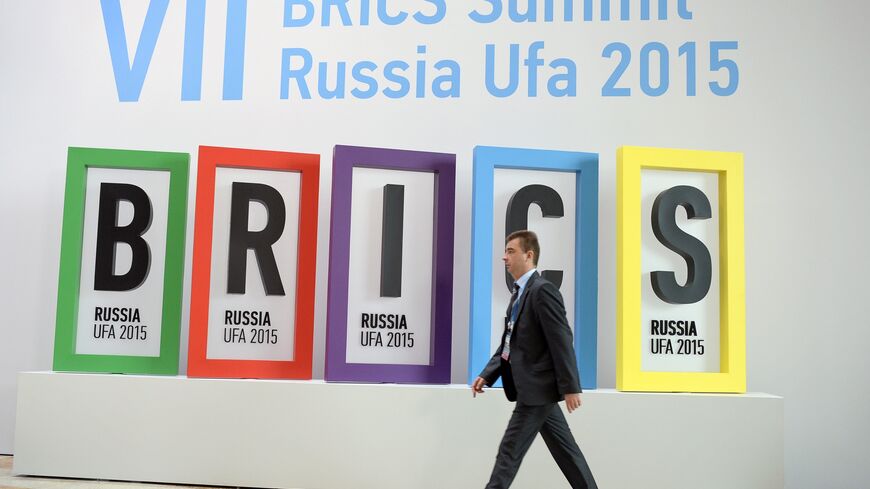Analysts are skeptical about an announcement made by supporters of Tunisia's populist President Kais Saied that the North African country wants to join BRICS, a group of leading emerging economies comprising Brazil, Russia, India, China, and South Africa.
On Saturday, Mahmoud bin Mabrouk, spokesman for the pro-Saied July 25 Movement in Tunisia, said that his country has plans to join the five-nation bloc that is often seen as an alternative to the Western hegemony.
“We will accept no dictates or interference in Tunisia’s internal affairs. We are negotiating the terms, but we refuse to receive instructions and the EU’s agenda,” bin Mabrouk said, in remarks made to the Arab News Agency.
The spokesperson described “a political, economic and financial alternative that will enable Tunisia to open up to the new world.”
In November, Algeria filed an official application to join BRICS, and bin Mabrouk said Tunisia would follow in its North African neighbor’s footsteps. Egypt has also announced its intention to join the bloc.
However, following bin Mabrouk’s remarks, there has been no official confirmation of Tunisia’s intention to join BRICS, and experts poured cold water on the idea.
No official word
Sharan Grewal, a nonresident fellow in the Center for Middle East Policy at Brookings, told Al-Monitor, “It's not clear how official this bid is. It didn't come from President Kais Saied or any governmental official, it came from one of the many small, new political movements that have emerged in support of the president since 2021."
He added, "The July 25 movement is not Saied's political party — he doesn't have one — and it's not clear what contacts or links there even are between them.” But he said it was plausible Saied would want to join the BRICS, given his populist, nationalist and anti-Western orientation.
Tunisia has been at an impasse in securing a $2 billion bailout package from the International Monetary Fund. “He [Saied] has railed against the proposed IMF program — that his own government negotiated — as a foreign diktat, and so he could in theory be viewing the BRICS as an alternative mechanism for foreign aid and support,” Grewal added.
“But in my mind the more plausible story here is that this statement is designed to put pressure on the IMF. ... Wielding the outside option of China in particular is likely to tap into paranoias in Washington that might lead US officials to support the IMF loan despite their reservations about Saied.”
Chinese and Russian press have expressed support for Tunisia’s bid, though it is unclear whether the two behemoths will seriously back the debt-saddled North African country joining the alliance.
The 14th #BRICS summit's Beijing Declaration made clear the organization supports membership expansion; China upholds the BRICS spirit of openness, win-win cooperation to accelerate the process, Chinese Foreign Ministry said Monday on Tunisia's reported bid to join BRICS. pic.twitter.com/SuH7HlMnko
— Global Times (@globaltimesnews) April 10, 2023
Dr. Sabina Henneberg, Soref Fellow at The Washington Institute for Near East Policy, said that Tunisia was likely too politically and economically unstable at this point to be welcomed into BRICS.
“Even Egypt and Algeria, which have both made bids and are much bigger countries economically and militarily, will not automatically join the alliance. Tunisia is also much smaller than all the other BRICS countries, so if it were to join this could open the doors for all kinds of other countries to make bids.”
Economic reforms needed
She pointed out that Tunisia needs important structural economic reforms in order to resume pre-2011 levels of GDP growth and avoid long-term debt.
“Beyond that, Tunisia would probably need to acquire more of a reputation as an international powerhouse — recently it has been trying to assert an anti-Western position but not necessarily with strong contributions to the global economy to offer,” she added. Henneberg said that Tunisia's historical ties with Western countries like the US will also mean that it will need to demonstrate stronger anti-West credentials.
Grewal also doubts that China or any BRICS member would be willing to invest heavily in Tunisia without an IMF rescue program. He pointed out that last month, the Chinese ambassador announced that China supports Tunisia's negotiations with the IMF.
Elsewhere in the region, Saudi Arabia and the United Arab Emirates have similarly been hesitant to invest in Tunisia without the reforms proposed by the IMF.
Alexandra Blackman, assistant professor of government at Cornell University, said that one of the guiding principles of Tunisian politics, especially under Saied, is the rejection of foreign interference, and this mantra has been repeated throughout the IMF negotiations.
She said BRICS may seem more appealing as it is perceived at coming with less foreign interference than the IMF, which some critics say is too aligned to US policy.
“However, while BRICS membership may not entail the same conditionalities that an IMF loan might, it also may not provide guaranteed funding quickly, and joining BRICS could open the Saied regime to new critiques regarding foreign interference by other actors. For these reasons, Tunisia is unlikely to join the alliance at this point," Blackman added.
Although changes in Tunisia's politics, such as access to reliable funding, are not likely in the near future, new attitudes about perceived foreign interference and preferred donors could alter the calculus regarding BRICS, she said.







